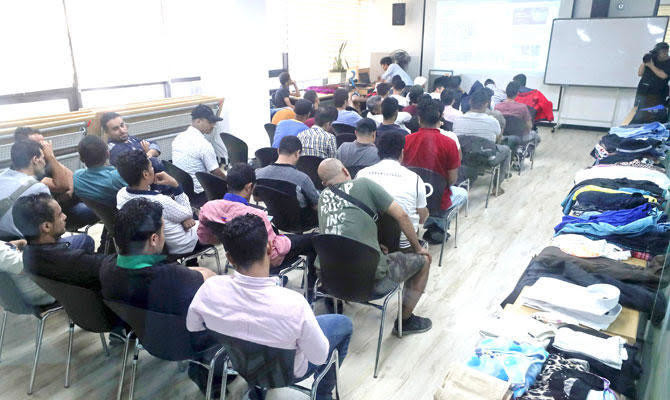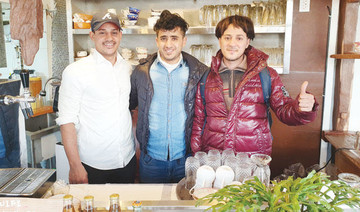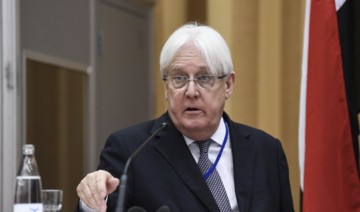JEJU ISLAND, South Korea: One of two Yemenis granted refugee status in South Korea told Arab News of his plans for the future, as well as his feelings about the hostility toward the hundreds of people fleeing the war destroying his homeland.
The man was among 484 Yemenis who arrived in the South Korean resort island of Jeju last year, taking advantage of its visa policy that lured tourists from across Asia.
But the influx, as well as leading to a change in visa policy for Yemeni visitors, triggered protests from anti-immigration organizations and refugee advocacy groups.
South Korea’s Justice Ministry said both Yemeni refugees had worked as journalists, writing articles that criticized Yemeni rebel forces, known as Houthis.
“The two applicants obtained refugee status based on the conclusion that they face the risk of persecution if they return home, given their past experiences of having been abducted and threatened by a rebel army,” Kim Do-kyun, head of the Jeju Immigration Office, said in a briefing.
Arab News met one of the refugees in Jeju last month. He asked not to be named.
“I worked at a newspaper for one year and six months with a TV company,” he said, without identifying the outlets. “I’m cautious to talk about my status since the immigration office recommended me not to do interviews with the media.
“I’m still contributing articles on Yemen for Korean media outlets. I’m planning to attend several lectures at a university and study Korean language more.”
He refused to comment when asked if the Korean government was too tough on recognizing Yemeni asylum seekers as refugees.
“I rather want to ask Koreans if their government is too strict. The only thing I can say is most of the Yemenis here are refugees from a war.”
Of the 484 Yemenis, 412 were given humanitarian stay permits and 56 had their applications rejected but entitled to challenge the decision in court. Another 14 cases were dismissed.
Those with humanitarian visas are allowed to travel and work but limited to benefits open to recognized refugees, including health care and the opportunity to have family members join them. They are also required to extend their stay every year.
“We allow Yemenis with humanitarian stay permits to live here for one year,” a Justice Ministry official said, asking not to be identified. “But if the situation in Yemen improves, they should return home. We’ll revoke their permit to stay or will not extend it.”
Advocacy groups denounced the government for pandering to public hostility toward asylum seekers.
“Giving only two of the 484 refugee applicants (status) is just shameful. The decision is seen as a pure political spin to avoid criticism for not accepting any refugees,” Shin Kang-hyob from the NGO Network for Refugee Rights told Arab News.
South Korea has granted refugee status to about 840 of some 40,400 non-Korean asylum seekers since 1992, which is only two percent of the applicants, according to government data. The figure is far lower than rates of other advanced countries, which are around 38 percent.
“Those with human rights visas don’t have big differences from those refused, except for the period of temporary stay,” Shin said. “Without basic support like health care, most of them still face economic hardships and other problems.”
Nasr Alyaremi, who works at a Yemeni restaurant in Jeju, said he was planning to travel to other countries because of South Korea’s tough rules.
“I’m married and want to bring my wife, to live with her in any safe country, but now I can’t bring her,” the 24-year-old said with the help of a translator. “But it is very difficult to get asylum.”
It is not only the harsh system that asylum seekers face, as anti-refugee sentiments run high.
“Refugees, including Yemenis, are not only a threat to our people but also that to our future generation,” anti-refugee activist Lee Hyang told Arab News. “Some of them are not even real refugees. Most of them are able-bodied men so they’re fake.”
Lee Un-ju, from the minority opposition Bareunmirate Party, called for revisions to the refugee act.
“Many of the asylum seekers coming on the visa-waiver program are not real war refugees but job seekers,” Lee said. “So the refugee act should be revised to prevent foreigners entering without visas from applying for refugee status.”
An online anti-asylum petition broke records last summer, attracting more than 700,000 signatures and forcing President Moon Jae-in to come up with tighter screening.
Some Koreans describe Yemenis as potential Arab terrorists or rapists, even calling the Yemeni restaurant in Jeju to blame the owner and staff for problems.
“The owner of the Yemeni restaurant is a traitor to our country,” read an online post from last month. “She helps fake refugees and uses them to buy money.”
Park So-hae, a Jeju resident, said people should show greater empathy.
“Our country suffered a war in the past, and many of Korean asylum seekers got help in foreign nations,” said the 42-year-old. “We should not be hostile to the Yemenis suffering from a war based on groundless rumors, and the government should come up with measures to screen the refugee applications without discrimination.”
Yemeni refugee speaks of life in South Korea
Yemeni refugee speaks of life in South Korea

- Advocacy groups denounced the government for pandering to public hostility toward asylum seekers
- Lee Un-ju, from the minority opposition Bareunmirate Party, called for revisions to the refugee act











